Bhutan's balancing act
By initiating democracy and increasing connectivity, change has washed over the Rooftop of the World. Amidst all the new challenges and temptations of the modern world, the sacred old traditions of Tsechu only become more precious.
By Ron Gluckman /in Bhutan
E
VEN IN A LAND AS RICH in pageantry as Bhutan—a deeply traditional Himalayan country where daily life often resembles a costume drama—nothing compares to the kinetic excitement of Tsechu festivals.Bhutanese arrive to Tsechu gatherings in their greatest finery, often saving all year for outfits. Many girls collectively purchase a gown, taking turns at the days-long celebrations of storytelling and dance.
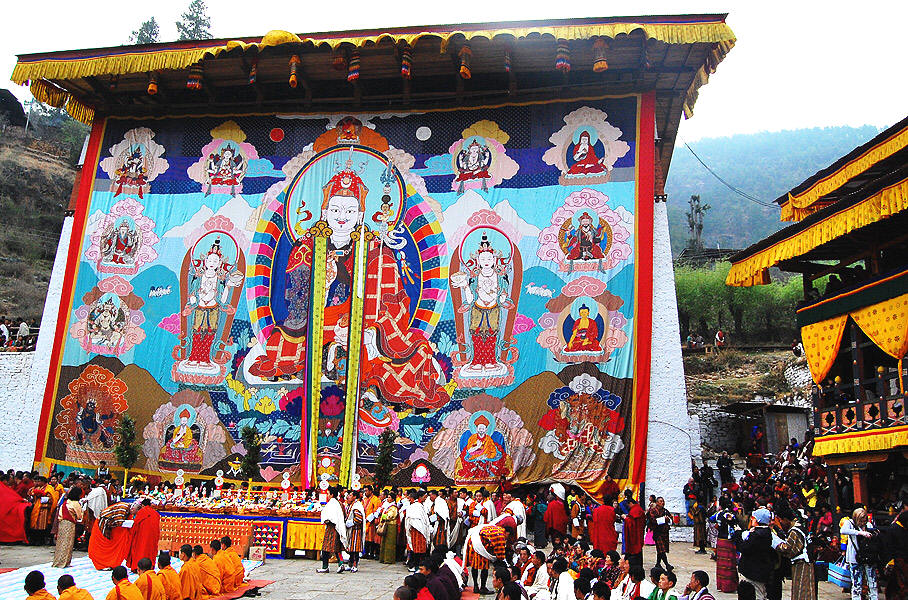
In Paro, home to one of the country's largest Tsechu festivals, I join thousands to watch a massive Tibetan thangka scroll unveiled before the Bhutanese king and queen.
Tsechu festivals recount a legendary confrontation that supposedly occurred 1,200 years ago. More accurately, however, the story is timeless. Any Bhutanese can describe its events as if they happened yesterday.
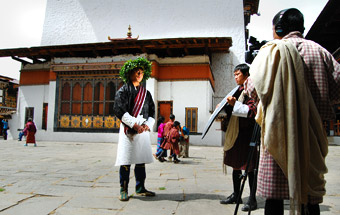 One day, a Tibetan guru assisted an ailing local king by luring a demon
from a cave. When the demon emerged as a lion, the guru took the form of a
garuda (a mystic bird) and vanquished the beast. The legend is re-enacted
through elaborate dances and by figures in garish masks.
One day, a Tibetan guru assisted an ailing local king by luring a demon
from a cave. When the demon emerged as a lion, the guru took the form of a
garuda (a mystic bird) and vanquished the beast. The legend is re-enacted
through elaborate dances and by figures in garish masks.
Tsechu is celebrated at various times in different locations around the country, but always around the tenth day of months in the Tibetan calendar; Tsechu means "10th day." Festivities include lots of spirited music and dance, and food stalls and games make it resemble a country fair.
But you also see monks in Tibetan masks and processions of the oracles. This is a major Buddhist festival, with rituals and solemn prayers inside the temples for 10 solid days.
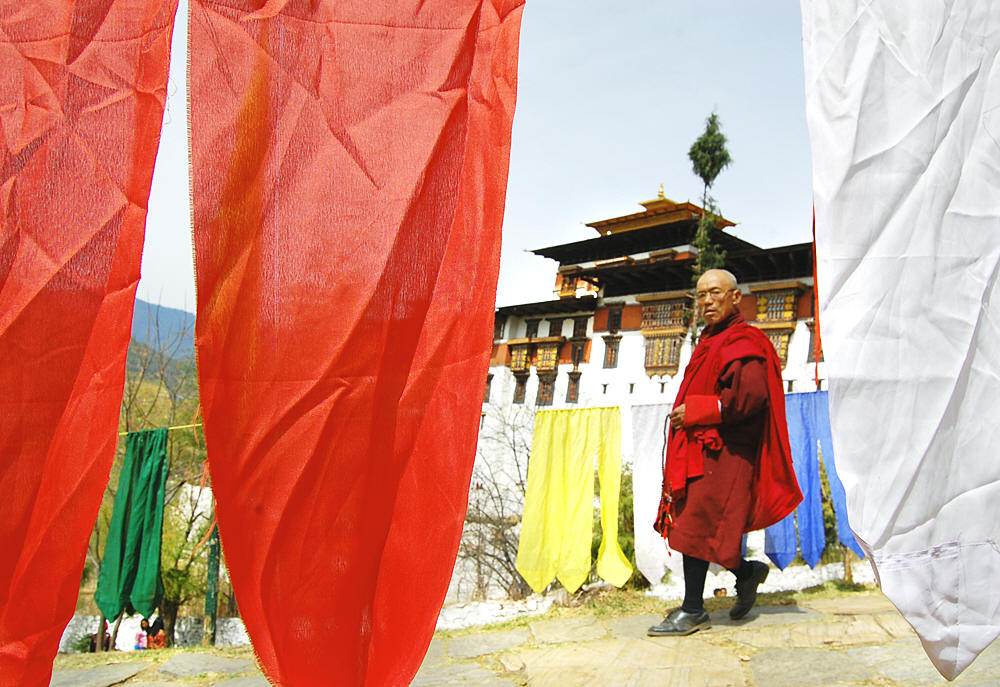 In recent years, Tsechu's ethereal dancers and demons have faced
competition from more earthly excitements. Bhutan first awoke to the outside
world four decades ago when foreigners were invited to the coronation of King
Jigme Singye Wangchuck.
In recent years, Tsechu's ethereal dancers and demons have faced
competition from more earthly excitements. Bhutan first awoke to the outside
world four decades ago when foreigners were invited to the coronation of King
Jigme Singye Wangchuck.
Modernization accelerated after the king's 2006 decision to initiate democracy and abdicate in favor of his modernization-minded son. The Internet, television and mobile phones quickly gained traction.
Political change has moved just as swiftly. In July, voters in Bhutan's second-ever general election swept the opposition party into power. Critical sway came from Bhutan's pre-eminent economic partner, India, which had cut fuel subsidies to Bhutan following reports that leaders were cozying up to China. The opposition pledged a return to close relations with India.
Perhaps most surprising was the election's turnout. Over 80% of eligible Bhutanese voted, suggesting that the population has embraced politics with the same passion as other modern trappings.
On a long drive from the remote Phobjika Valley to distant Bumthang, birthplace of this picturesque kingdom founded by Tibetan seers, my guide and driver talked for hours about the ins and outs of the new political process.
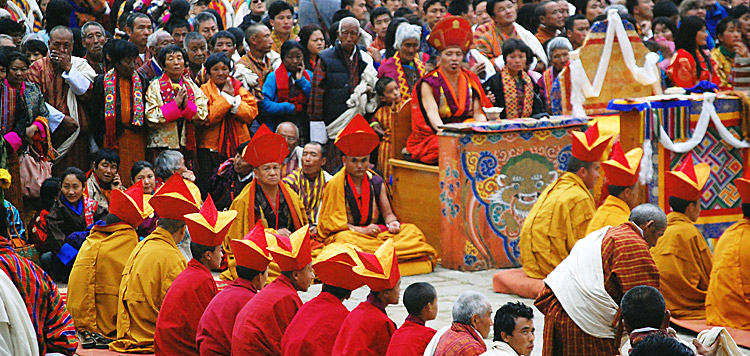
What astonished me was the sophistication of the debate. When I last visited in 2005, most talk centered on deities—saints riding on eagles, for instance, or gurus whose tantric powers and sexual prowess subdued dragons and demons.
Back then, nobody I spoke with wanted to abandon absolute monarchy for elections, including the leaders of political parties.
Bhutan is a different country today. Already the pressures of modernity have produced a property boom in the capital of Thimphu. Only recently a village among rice fields and forest, Bhutan's largest city is now a thumping hive of new construction.
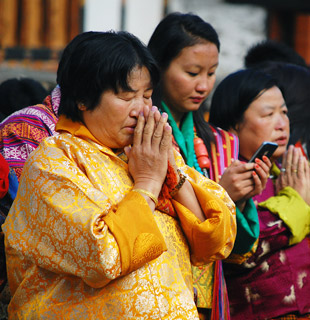 Property values have exploded as
officials fret about a bubble. New Prime Minister Tshering Tobgay says the
economy and jobs will be his focus instead of Bhutan's traditional yardstick of
performance, Gross National Happiness.
Property values have exploded as
officials fret about a bubble. New Prime Minister Tshering Tobgay says the
economy and jobs will be his focus instead of Bhutan's traditional yardstick of
performance, Gross National Happiness.
This upheaval makes festivals all the more important to maintaining unity. Even with options like television and the Internet, Bhutanese choose traditional attractions, says Lopen Gembo Dorje, secretary general of the national monastic body.
"If anything, in Bhutan, the importance of Tsechu just grows." In religious terms, Tsechu may not be Bhutan's most important celebrations, but they are the most widely attended.
However, even Tsechu moves to Bhutan's new groove. Tsechu performances now air on television, a medium that only launched in Bhutan 1999. "So many watch on TV, and we talk about the meaning and importance," says Mr. Gempo.
"You might assume that would decrease the audience, but every year, more come to Tsechu, even as many more watch on TV."
Such popularity demonstrates a lack of conflict between ancient gods and modernizing Bhutan, says Mr. Gembo. "Tsechu stays the same, even as Bhutan changes. Maybe some features change, and there are different dances, but the essence stays the same."
In a newly democratic Bhutan, happiness may be tested by the temptations and increasing influence of the outside world. But Teschu, Mr. Gembo says, "is timeless."
Ron Gluckman is an American journalist who has been living in and covering Asia for over two decades. Bhutan remains a country of particular personal appeal and pleasure. This story ran in the Wall Street Journal on August 12, 2013.
All pictures and text copyright by Ron Gluckman
To return to the opening page and index
push here
[right.htm]
